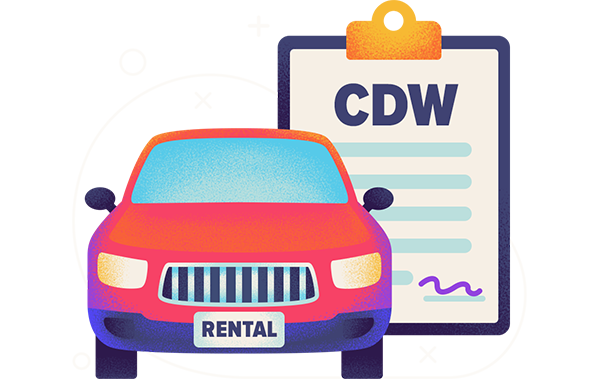A collision damage waiver (CDW) is an optional contract sold by rental car companies to cover you in case of an accident or other damage to your rental car. The collision damage waiver covers only the rented car and removes your liability for damage caused to it in an accident. Your rental car company may call it a collision damage waiver (CDW) or loss damage waiver (LDW), and it may also be referred to as collision damage waiver insurance or loss damage waiver insurance.
Key Things to Know About Collision Damage Waivers
- A CDW covers damage to the rental car, but not to other people’s property.
- Collision damage waivers for economy vehicles typically cost $10 - $30 per day.
- Damage waivers may cover theft, depending on the rental company.
- Personal auto insurance and credit card benefits serve as alternatives to collision damage waivers.
What Does a Collision Damage Waiver Cover?
A collision damage waiver covers most physical damage to a rental car, as well as other costs that may not fall under other insurance policies. For example, a damage waiver usually provides “loss of use” coverage when the car is under repair and thus cannot be rented out. Additionally, collision damage waivers typically cover towing and administrative fees for the rental company.
What a Collision Damage Waiver Covers
- Damage caused by an accident
- Damage caused by something other than an accident, like vandalism or a natural disaster
- Administrative and towing fees
- Lost revenue for the rental company while the car is under repair and cannot be rented out
- Theft (in some cases)
What a Collision Damage Waiver Does Not Cover
- Other people’s property damage
- Anyone’s injuries or medical bills
- Damage resulting from risky behaviors, such as speeding or drunk driving
- Loss or theft caused by negligence, like leaving the car running outside of a hotel
- Damage or loss occurring in certain countries, like Mexico
If you are renting a car in the United States, the damage waiver offered to you will typically cover vehicle repairs without the need for you to pay a deductible. If you are traveling internationally and decide to rent a car, however, it is possible that the waiver will include a deductible that you would have to pay in the event of an accident, which may be up to several thousand dollars. The higher the deductible, the less value the waiver may potentially have for you.
How Does a Collision Damage Waiver Work?
A collision damage waiver works by protecting the renter from financial liability in the event of an accident that damages the rental vehicle. A CDW, or LDW, can be added to the cost of your rental for an additional daily fee. If you accept the CDW from the rental car insurance company and your rental car is damaged, you will not be responsible for compensating your rental car company for whatever portion of the damage the CDW covers.
If you are involved in an accident in a rental car and you have purchased a CDW, you should immediately report the incident to your rental car company and then file your claim as soon as possible. Once the rental car company has assessed the damage and determined it was a covered incident, the rental car company will cover the cost of repairing or replacing the rental car up to the limit set in your rental agreement.
It is worth noting that if you do not want to purchase a CDW, and you want to use the coverage provided by your credit card company instead, you will need to explicitly deny the CDW.
How Much Does a Collision Damage Waiver Cost?
The cost of a collision damage waiver can range from a modest fee to nearly doubling the total rental price. Normal costs are $10 – $30 per day for economy vehicles, or 25% – 40% of the base rental price.
The table below provides the daily cost of a damage waiver from different rental car companies at different locations. The price you are quoted may differ, so it’s best to shop around and read your rental agreement.
Collision Damage Waiver Cost by Rental Company
| Company | Daily Rental Cost | Daily Damage Waiver Cost | Total Cost |
|---|---|---|---|
| Budget | $42 | $17 | $59 |
| Enterprise | $44 | $15 | $59 |
| Hertz | $47 | $16 | $63 |
Note: Quotes were obtained for an economy-sized vehicle.
Collision Damage Waiver Alternatives
You may have three alternatives to purchasing a damage waiver. Your credit card benefits, your existing auto insurance policy, or any travel insurance will likely cover rental car mishaps.
Credit Card Benefits
Perhaps the best option is to leverage the benefits that may be provided to you through your credit card. Three major credit card networks—Mastercard, Visa, and American Express—provide coverage with some of their credit cards. Check out WalletHub’s analysis to identify the best credit cards offering rental car insurance coverage.
There are a few things you’ll need to keep in mind when using your credit card for damage coverage:
- Make sure to use the credit card to reserve the car and pay for the reservation. Otherwise, the coverage will not apply. Also, keep in mind that rental car insurance is typically only offered on credit cards – most debit or prepaid cards will not offer coverage.
- You must decline any damage waiver that comes with your rental to utilize your credit card benefits. Read through the rental car agreement to make sure an inferior waiver is not included in the contract.
- It is secondary to other forms of insurance. The coverage offered by your credit card will be secondary to other forms of insurance you may have. For instance, if you have a personal auto policy, your personal coverage must be exhausted first before your credit card coverage will kick in.
- Credit card benefits will not cover you in all situations. If you rent a car for a long period of time (over 15 days in the U.S. or 31 days internationally), rent certain vehicles (trucks or vans), or engage in reckless behavior behind the wheel, damages may not be covered by your credit card.
Personal Auto Insurance
Another alternative to a damage waiver is using your existing auto insurance if you have full coverage, since rental car damage is likely to be covered by your personal collision and comprehensive insurance. Insurance will typically cover car rentals in the U.S. and Canada, but not rentals in other countries.
There are circumstances, however, when purchasing a damage waiver may make more sense than relying on your existing car insurance policy. Here are some things to consider before declining a collision damage waiver and relying on your personal auto insurance:
- Your personal insurer could raise your rates. Filing a car insurance claim usually results in an increase in your premiums. If you purchase a damage waiver, you don’t have to worry about the possibility of your insurance company raising your rates.
- You’ll have to pay a deductible. Your car insurance policy will most likely have a deductible that you have to pay before other expenses are covered. There is usually no deductible with a CDW.
- You may end up liable for some of the damage. If the damage to your rental car ends up exceeding the limits of your personal auto policy, then you may be responsible for the difference. For instance, if you rent a car with a much higher value than your personal vehicle, your personal insurance won’t cover the full cost of the rental should it get totaled.
Travel Insurance
A third alternative to a damage waiver is purchasing travel insurance. Travel insurance covers a wider range of events than a collision damage waiver, such as trip cancellations and interruptions, and includes coverage for rental car damage.
Here are some things to consider before purchasing travel insurance in lieu of a collision damage waiver:
- It may have specific exclusions or limitations. The coverage offered by travel insurance may not cover all situations or types of rental car damage. For instance, there may be limits on the type of rental car that is covered.
- May be more expensive than a CDW. Travel insurance policies can vary widely in cost, depending on the level of coverage and the length of your trip. In some cases, purchasing travel insurance may be more expensive than purchasing a CDW.
- The coverage limits may be lower than a CDW. This means that if you are involved in an accident and the cost of the damage exceeds your coverage limits, you could be responsible for paying the difference out of pocket.
We know there are a lot of things to consider, and deciding whether a damage waiver is the right choice for you can be confusing. In the section below, WalletHub will help you decide whether a collision damage waiver is worth it for you.
Is A Collision Damage Waiver Worth It?
For most people, buying a damage waiver is not worth the money. While it may seem prudent to buy just to be safe, the purchase of loss or collision damage insurance may cancel or be redundant with other forms of insurance you already have.
On the other hand, there may be certain situations where paying a comparably small fee to buy a damage waiver may avoid enough of a headache to make it worthwhile. Do a little research and know how your existing car insurance policy covers when it comes to rental cars, and whether your credit card offers this type of coverage as a benefit.
Regardless of your decision, consider taking ‘before’ pictures of your rental vehicle when you pick it up, especially if you see any existing damage. When you drop the car off, have the attendant do a walk around the vehicle. If that isn’t possible, take ‘after’ pictures as well. Doing this can document any damage that was already present and give you peace of mind that you can prove no damage occurred to the car while you were renting it.
Riding through the series of questions below may help:



WalletHub experts are widely quoted. Contact our media team to schedule an interview.